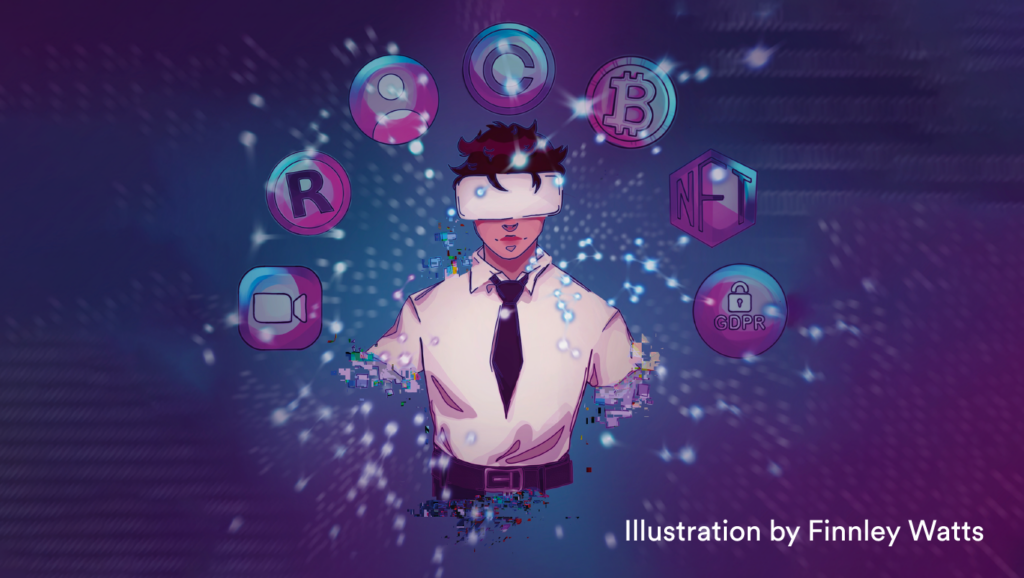Reputation in the metaverse
20.10.2022

Whether our current defamation laws can stretch to answer the various questions that may arise in the context of the metaverse will only become clear over time.
In this tenth article in our series we examine the difficulties of bringing a defamation case arising from actions or words spoken in the metaverse.
Imagine a scenario where you and your colleagues (or rather your and their avatars) are at a work conference in the metaverse. An industry expert is giving a presentation and makes a false and defamatory remark about you. That remark could obviously cause harm to your reputation, and you could, in principle, bring a claim against the person who made the allegation. But what about a scenario where your avatar doesn’t bear any resemblance to you, has a different name and identity, and has cultivated a reputation of its own in the metaverse running a successful business (let’s say a gallery selling NFTs). What is the position if your avatar is defamed?
Whose reputation is it anyway?
A key requirement of a defamation claim is that the statement complained of identifies the claimant. This doesn’t mean that you need to be named. You could be identifiable by reference (e.g. the owner of Wayne Enterprises or the person who lives at 221B Baker Street), and that remains the case even if only a small number of people would be able to identify you.
Returning to our gallery-owning avatar, what if no one knows that it’s you behind it? If your NFT gallery is being impacted financially and is owned by a limited company in the real world, one option could be for the company to bring a defamation claim, relying on a drop-off in custom to satisfy the necessary threshold of serious financial loss. In those circumstances, the court would need to be satisfied that reference to the avatar would be understood to be a reference to the company. If the allegation is “personal” to the avatar rather than specifically related to the gallery that may be a non-starter. Of course, the answer might simply be that if no one knows it’s you, you can’t do anything about it – after all, a defamation claim can only be brought by a natural or legal person.
In circumstances where the identity of the person behind the avatar making the defamatory statement is unknown, we are in more familiar territory. The making of defamatory statements online by anonymous users is nothing new and a claimant could ask the courts to order the relevant platform to disclose the identity of the individual behind the avatar. Another option may be to argue that the platform is a “publisher” of the defamatory statement, though, again, that is far from straightforward.
Whether or not identification of a claimant or defendant is even an issue will depend, to some extent, on each platform’s requirements. Platforms may require, for example, that users create an avatar with their own name. However, it is a violation of many existing social media platforms’ community guidelines to impersonate others or to set up fake profiles, but that doesn’t stop it happening; the metaverse will likely face the same challenges.
Was it something I said?
Another relative unknown when it comes to defamation in the metaverse is whether what is said in that context would constitute libel or slander. The difference between the two, in brief, is that libel is defamation in a permanent form (e.g. published in a newspaper or posted on social media), whereas slander is defamation in a transitory form (e.g. spoken word or a gesture not in a permanent form). The reason this matters is that, in this jurisdiction, an action in slander is more difficult to get off the ground than in libel (and they are therefore relatively rare). This is because there are more specific requirements relating to the damage that must have arisen as a result of what has been published or said.
Let’s return to our example of a work conference. If the conference took place in the real world and a defamatory remark was made by the speaker, assuming that the session was not being recorded or broadcast, there’s little doubt that this would constitute slander. If the same scenario were in the metaverse, the position is not nearly as clear-cut and could, conceivably, vary from platform to platform. One metaverse might have a recording function where a user may be able to record a session or even pause it mid-way through and rewind over what has just happened. In that context, statements made on the platform would probably be considered as libel. If a recording is not being made of the session it’s more likely to be slander. However, it’s possible that, whilst a session is not being recorded, the platform might have the ability to retrieve and retain the content in question, which may tip it towards libel. But that is uncharted territory.
Final comments
This is just just a snapshot of some of the issues relating to defamation which may arise if the metaverse becomes as popular as some companies, such as Meta, have predicted it will. Whilst it’s tempting to think of the metaverse as simply an extension of the internet around which our existing laws may stretch, time will tell if our current defamation laws are flexible enough to meet the issues which may arise. On the other hand, data protection law has increasingly been utilised by individuals alongside, and in some cases instead of, defamation law in order to seek relief for reputational harm, a trend we expect to continue in the context of the metaverse. While this may be an alternative recourse in relation to reputational harm in the metaverse, it also comes with a range of issues which we will explore, in our data protection article, later in the series.
Still have questions? Be sure to read our metaverse articles below:
- Welcome to the metaverse: part one (definitions for a digital world)
- Welcome to the metaverse: part two (the metaverse’s past, present and future)
- NFTs in the metaverse
- Brand protection in the metaverse
- Advertising in the metaverse
- Copyright in the metaverse
- Taxation in the metaverse
- Competition/antitrust in the metaverse
- Jurisdiction and torts in the metaverse
- Online harms and safety in the metaverse
- Data protection in the metaverse
- Working in the metaverse – what employers need to know
Bristows Tech Summit 2022What should innovative technology companies be looking out for over the next year? Our team of leading experts tackled the most important legal and commercial issues facing the technology industry. |

Victoria Baron
Author
